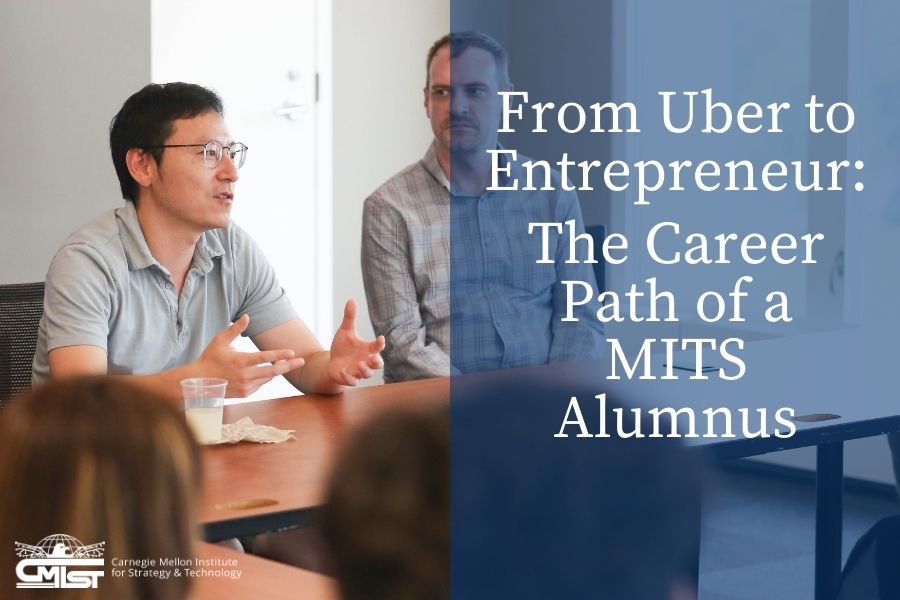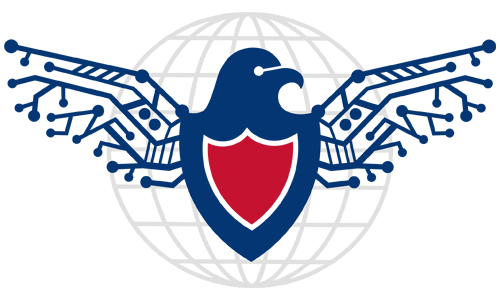
From Uber to Entrepreneur: The Career Path of a MITS Alumnus
By Arden Ryan
With a fast-changing job landscape and growing employment insecurity, students benefit from seeing how Carnegie Mellon University (CMU) graduates are using their degrees successfully and navigating current challenges. Ming Fang, a 2015 graduate of Carnegie Mellon University’s Master of Information Technology Strategy program (MITS), understands the value in sharing his story and inspiring the next generation of changemakers. On his latest trip to CMU, he sat down with students from the Carnegie Mellon Institute for Strategy and Technology (CMIST) to do just that.
In the eight years since Fang graduated from the MITS program, he has gained valuable job experience, which built upon his skill sets and propelled him towards his ultimate goal of building a startup company.
Fang first joined Uber Technologies as a software engineer, interviewing during his last semester at CMU. Although he had other job options, Fang noted that Uber was a fledgling company at the time and he was enticed to “take the bet and try to ride the exciting startup journey.”
He joined Uber’s risk management division and worked with his team to combat fraudulent activities. He gave examples of people using stolen credit cards to pay for trips or users exploiting rider promotions to unfairly gain incentives.
“On the risk team, we collaborated with analysts, data scientists, and a lot of other engineers to develop the software system to detect that kind of activity and prevent it from happening,” Fang explained.
Later, Fang pivoted from risk management to the infrastructure team, handling Uber’s databases and cloud infrastructure across the platform. He expressed that it was a “fun, interesting, very rewarding journey,” providing him knowledge on cloud technology.
After more than three years, Fang left Uber to join Google, where he utilized his new knowledge to work on AI for Google’s Cloud Platform, providing the infrastructure and platform to external users. At Google, Fang was one of the founding members of Google Cloud’s AI Feature Store project, a system for managing and storing machine learning features.
“It was a very rare bottom-up project where we started from nothing, from scratch,” Fang said. “We established the business use cases, and eventually got the buy-in from the leadership and assembled a team” to review the fully-fledged feature store.
Fang was “part of the entire journey from zero to launching the product,” he said, serving as the project tech lead.
On that journey, Fang said, he learned “not just how to think about the machine learning system that will be used by data scientists, but also the end-to-end journey of building enterprise software.” He and his team grew the product from nothing to meeting Google’s high standards of stability, scale, scalability, and safety.
It was during his time at Google that Fang decided to lean into his entrepreneurial visions and work towards the startup dream he has always had in hopes of making an impact on the world.
Fang teamed up with one of his previous colleagues from Uber and co-founded Sperta, an online risk decision platform. He had done similar work at Uber for internal use cases, but saw a greater need in the industry and wanted to fill the void.
With Fang as Chief Technical Officer (CTO) and his colleague as Chief Executive Officer (CEO), the two began fundraising, building a team, and working to achieve the dream. Two years later, the team has launched their product and is building new features, attracting new customers and partners. “It’s really exciting,” Fang said.
Fang’s main objective on his recent visit to Pittsburgh was participating in a university hiring event and reconnecting with the school - including the students in the MITS program he graduated from. He stated that he hopes to one day hire interns directly from CMU, a university with “a very good program and a lot of good students.”
After attending the MITS alumni roundtable, Fang expressed delight with the growth of the MITS program, noting that his cohort was composed of just four students in 2015. His roundtable attracted over 20 CMIST students and nearly the entire MITS cohort, exceeding his expectations.
“Students were very eager to get connected and learn about what’s going on in the industry,” Fang said.
In sharing about his work experience, Fang recognized there is more than just the technology and engineering to consider when building a startup, for instance the security aspects. Understanding the broader context is crucial.
“The MITS program is a very diverse and very interdisciplinary program, spanning multiple aspects in technology, engineering and even security policies,” Fang noted. Those bigger-picture ideas were a key takeaway from his MITS education. Getting a solid education in technology, engineering, and computer science, as well as the exposure to security and policies, helped prepare Fang for his startup journey.
In Fang’s current work, managing company liabilities, some of the risks he handles come from regulation or compliance requirements, or specific scenarios within the financial world.
“It's not just the technology itself, it's also about how you want to solve the real use cases, real problems in society, how the regulatory aspects come into play, and how your tech should apply to that,” Fang explained.
He reflected that his MITS degree provided him the well-rounded skill sets needed to incorporate such technology into real-world solutions.
If Fang could leave graduating students with one essential tip, his advice would be to “try and find what interests you and what your passion is, instead of following the trend, following what’s hot, because the trend can change,” Fang said. “What will prepare you well and motivate you to do better is what interests you, what you’re passionate about.” Passion, not fashion, will drive you to achieve your wildest dreams.
